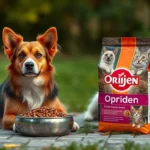
Introduction
Hypothyroidism in dogs is a condition that occurs when the thyroid gland produces insufficient amounts of thyroid hormones. These hormones are crucial for regulating metabolism, energy, and overall health. The condition can lead to various health issues if not managed properly.
Definition of Hypothyroidism in Dogs
Hypothyroidism is primarily caused by autoimmune diseases, thyroiditis, or certain medications that can impair thyroid function. The most commonly affected breeds include Golden Retrievers, Doberman Pinschers, and Cocker Spaniels. Symptoms can vary but often include weight gain, lethargy, skin problems, and even behavioral changes.
Importance of Nutrition for Dogs with Hypothyroidism
Nutrition plays a critical role in managing hypothyroidism. A well-balanced diet can help support thyroid function, while the wrong foods may worsen the condition. Improper nutrition can lead to exacerbated symptoms, weight gain, and other health complications.
Understanding Hypothyroidism in Dogs
What is Hypothyroidism?
Hypothyroidism is a metabolic disorder resulting from a deficiency in thyroid hormones. This condition is common in middle-aged to older dogs but can occur in younger dogs as well. Both male and female dogs can be affected, but certain breeds are more predisposed.
Symptoms of Hypothyroidism
Symptoms of hypothyroidism can manifest physically and behaviorally. Common signs include:
- Weight Gain: Despite a normal diet, dogs may gain weight due to slowed metabolism.
- Lethargy: Affected dogs often exhibit reduced energy levels and a lack of interest in play.
- Skin and Coat Issues: Dogs may experience dry skin, hair loss, and increased susceptibility to infections.
Diagnosing Hypothyroidism
Veterinary tests are essential for diagnosing hypothyroidism. Blood tests measuring levels of thyroid hormones (T4 and TSH) are commonly used. Regular check-ups are particularly important for breeds predisposed to this condition, as early detection can lead to better management.
The Role of Nutrition in Managing Hypothyroidism
Nutritional Needs of Hypothyroid Dogs
Dogs with hypothyroidism require a diet rich in essential nutrients to support their thyroid health. Key nutrients include:
- Proteins: Essential for maintaining muscle mass and metabolic function.
- Omega Fatty Acids: Help reduce inflammation and support skin health.
- Antioxidants: Protect against oxidative stress and are crucial for overall health.
A balanced diet is vital for ensuring these nutrients are adequately supplied.
Foods to Avoid
Certain ingredients can exacerbate thyroid issues and should be avoided:
- Soy: Contains isoflavones that can interfere with thyroid function.
- Certain Grains: Wheat and corn can cause inflammation in some dogs.
- Artificial Additives: Preservatives and fillers can lead to adverse reactions and weight gain.
How Diet Influences Thyroid Function
Diet significantly influences thyroid hormone production. A balanced diet helps maintain proper hormone levels, while deficiencies can lead to complications. Omega fatty acids and antioxidants are particularly beneficial for promoting thyroid health.
Best Dog Foods for Hypothyroidism
Criteria for Selecting Dog Food
When selecting the best dog foods for hypothyroidism, consider the following criteria:
- Nutritional Value: Ensure the food provides a balanced diet with high-quality ingredients.
- Ingredient Sourcing: Look for brands that prioritize natural ingredients without fillers or artificial additives.
Top Commercial Dog Foods for Hypothyroidism
Grain-Free Options
Grain-free diets can benefit dogs with hypothyroidism by reducing inflammation and improving digestion. Recommended brands include:
- Orijen: Known for high protein content and quality ingredients.
- Taste of the Wild: Offers a variety of flavors with natural ingredients.
Prescription Diets
Veterinary-prescribed diets are specifically formulated to manage health conditions. Notable brands include:
- Hill’s Prescription Diet: Offers tailored nutrition for thyroid health.
- Royal Canin: Provides specialized formulas aimed at managing specific health issues.
High-Protein Diets
High-protein diets support metabolic health in dogs with hypothyroidism. Some recommended brands are:
- Blue Buffalo: Known for its natural ingredients and high protein levels.
- Merrick: Offers grain-free, high-protein options that are both nutritious and tasty.
Homemade Diet Options
Many pet owners choose to prepare homemade meals for their dogs, which can ensure fresh ingredients and control over nutrition. When considering a homemade diet, include:
- Proteins: Chicken, turkey, or fish provide essential amino acids.
- Vegetables: Carrots and spinach are nutrient-rich and beneficial for overall health.
- Supplements: Adding fish oil or specific vitamins can enhance the diet.
Additional Dietary Considerations
Supplements for Thyroid Health
In addition to a balanced diet, certain supplements can support thyroid health:
- Vitamins: B vitamins and vitamin E are beneficial for overall health.
- Minerals: Zinc and selenium play crucial roles in thyroid function.
- Natural vs. Synthetic: While natural supplements are often preferred, consult your vet for the best options.
Regular Monitoring and Adjustments
Regular veterinary check-ups are crucial for dogs with hypothyroidism. Monitoring thyroid hormone levels can help determine if dietary adjustments are necessary. Changes in health status may require modifications in diet to ensure optimal nutrition and thyroid support.
Conclusion
Proper nutrition is vital for managing hypothyroidism in dogs. By focusing on high-quality, nutrient-rich foods and avoiding harmful ingredients, dog owners can significantly improve their pets’ quality of life. Always consult with a veterinarian before making dietary changes to ensure the best care for your dog.
Call to Action
If you have experiences or tips on dog nutrition and hypothyroidism, feel free to share! Stay updated on dog health tips by following our newsletter or social media.
References
- A list of scientific studies, veterinary resources, and articles consulted in the research process.









